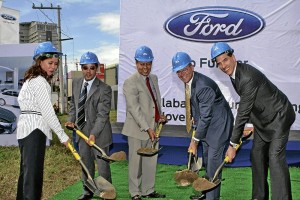
AT THE groundbreaking ceremony of the new Ford Alabang dealership site are (from right) Krieger, Bradley, Borromeo, Ford Alabang general manager Paolo Borromeo and Ford VP for marketing and sales Minnie Valencia
By the end of this year, the $270-million Ford Motor Co. assembly plant in Santa Rosa, Laguna, will shut down after the last locally assembled Ford Escape rolls out. The announcement last June by Ford Group Philippines (FGP) about the closure of its manufacturing facility led some people to think that Ford is abandoning the country again like it did in 1985.
Yes, FGP is pulling out its investment in production operations in the Philippines, but not its marketing, sales and service operations, which are being expanded rapidly with the opening of a dozen new dealerships nationwide in the next six months beginning with the Cainta dealership inauguration last October, to eventually reach a total of 35. All the new sales and service outlets will be built according to Brand@Retail II, the new global design standard based on Ford’s brand pillars of Quality, Green, Safe and Smart. To spur the aggressive marketing momentum, eight all-new One Ford vehicles will be launched here by mid-decade, with four already introduced this year (the 2013 Ranger, Explorer, Mustang and Focus.)
Ford Asean president. After the acquisition of Mazda Philippines, the FGP affiliate, by the Berjaya Group last September, Ford Group Philippines became simply Ford Philippines. Last Thursday, Ford Philippines celebrated two events in one day that warranted the presence of the new Ford Asean president, Matt Bradley: the groundbreaking ceremony at the new Ford Alabang dealership site and the opening of the Ford Pampanga dealership.
In an exclusive one-on-one interview in the presence of Ford Philippines president Randy Krieger after the groundbreaking rites, Bradley said that the Asean car market has grown 30
percent so far this year. He predicted that in the next decade, the Asia-Pacific region (China, India and the Asean) will make up 60 to 70 percent of the global growth of Ford. And at the end of the decade, 80 percent of Ford’s global portfolio will be driven by the Asia-Pacific market.
Bradley should know whereof he speaks, having been based in Shanghai for almost two years as vice president for Ford Asia-Pacific and Africa sales, service and distribution before he was posted to Bangkok last August as Ford Asean president. Bradley, who has been with Ford Motor Co. for 23 years, lauded Ford Philippines’s robust performance in the last two months, selling 1,224 units in October alone, or 50 percent more than the same period last year, with the Ranger, Everest and Fiesta topping sales. Even the Mustang, Ford’s pricey pony car, took off with 45 units sold in October. Both Bradley and Krieger were bullish about a 7- to 8-percent market growth for Ford Philippines this year.
One Ford plan. Given this successful sales record, Bradley foresees Ford Philippines participating in and contributing to the product transformation and dealership growth-led One Ford Plan for the Asean market that will increase dealerships in the region from 150 to 300 in the next five years. Although only about 150,000 new vehicles are sold in the Philippines annually compared to one million each in Thailand and Indonesia, Bradley said that Ford’s market share here is the highest percentage in the Southeast Asian region.
Bradley revealed that the new $450-million, state-of-the-art Ford Thailand Manufacturing plant produces 150,000 units yearly for the domestic and export markets. But it can be pointed out that Ford’s investment in growing the Asean market is small compared to its growth program in China, where it has invested a total of $4.9 billion since 2006. Ford sees China as a key engine driving its global growth. According to The Wall Street Journal (WSJ), Ford expects to increase its total number of dealers in China to about 400 nationwide by adding as many as 115 this year and plans to introduce 15 new vehicles and 20 advanced powertrains in the country by 2015.
Profits. Ford’s heavy investment in the Asia-Pacific region, along with a currently sluggish Chinese market, is damping profitability, although Ford’s North American third-quarter profit margin rose to 12 percent, the highest in its history, which translated to a $2.3-billion pretax profit for the Dearborn, Michigan-based company. A report in the WSJ avers that North America’s strong performance compensated for Ford’s $468-million third-quarter pretax loss in Europe, where Ford has announced a plan to cut 6,200 jobs and close three plants. Ford expects to lose more than $1 billion in Europe this year. Meanwhile, Asia and Africa posted a pretax profit of $45 million in the third quarter.
For Ford, investing heavily in the Asia-Pacific region is a well-calculated gamble if Bradley’s bullish forecast comes true that the region will drive 60 to 70 percent of Ford’s global growth in the next decade. Here’s a sign that Bradley’s projection may be spot-on: Ford finance chief Robert Shanks told the WSJ in a conference call last month that Ford actually sold more Focus compact cars in Asia and Africa than it did in North America or Europe.
PHOTOS BY EUGENE ARANETA